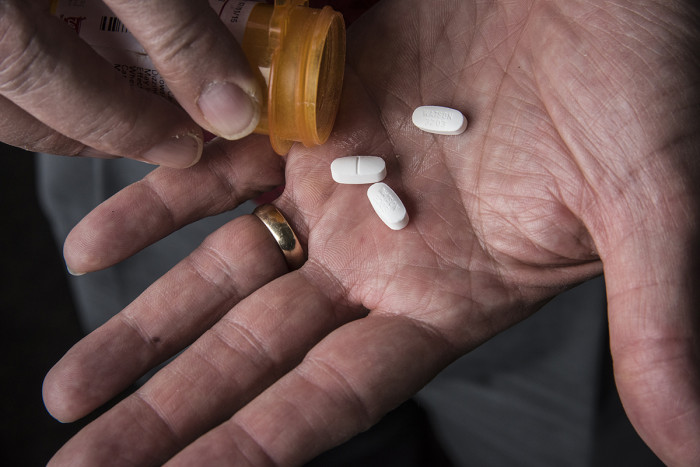Doctors recommend prescribing fewer opioids after surgery
Anesthesiologist and surgeon suggest new approaches to pain medications for surgery patients
 Robert Boston
Robert BostonExperts at Washington University School of Medicine in St. Louis are recommending that surgeons and anesthesiologists consider cutting back on the number of take-home opioid pills prescribed to patients after surgery. The nonmedical use of opioid drugs costs the U.S. economy more than $70 billion annually.

Bolstering new federal guidelines that advise primary care doctors to carefully weigh the prescribing of opioid painkillers, two experts at Washington University School of Medicine in St. Louis are recommending that surgeons also consider cutting back on the number of take-home opioid pills prescribed to patients after surgery.
In a commentary published in the April issue of the journal Anesthesiology, anesthesiologist Evan D. Kharasch, MD, PhD, and surgeon L. Michael Brunt, MD, suggest new approaches for administering and prescribing pain medications to surgery patients.
Their recommendations coincide with newly released federal guidelines from the Centers for Disease Control and Prevention (CDC), the agency that oversees public health.
“There is a massive quantity of unused opioids in the community,” said Kharasch, the Russell D. and Mary B. Shelden Professor of Anesthesiology and professor of biochemistry and molecular biophysics at the School of Medicine. “Most patients get prescriptions for pain medications after surgery, but when they don’t take all of the drugs, the remaining pills can be misused by people for whom they weren’t prescribed.”
Kharasch said it’s not unusual for a surgery patient to be sent home with dozens of pills, many of which get relegated to the medicine cabinet.
“One approach to the problem may be to prescribe fewer pain pills,” he said. “Another is to encourage pharmacies to take back unused opioids so that people can get the drugs out of the house and away from others who may want to misuse them.”
He and Brunt also are encouraging anesthesiologists and surgeons to re-evaluate how pain-killing drugs are used not just after surgery but during operations.
“There has been a trend to use opioid medications that wear off more quickly in surgery patients,” Kharasch said. “But what if we were to use longer-duration drugs during surgery so that patients were more comfortable for a longer time after an operation? Would that mean they would need fewer pain pills when they go home? That’s something that needs to be studied.”
The nonmedical use of opioids has a huge price tag. The CDC estimates that misuse of such drugs costs the U.S. economy more than $70 billion annually, including health-care costs, lost time at work and criminal justice costs.
About 5 million Americans misuse prescription opioid pain relievers — a number that has risen in recent years. Many of the abused drugs initially are prescribed by doctors and then taken from medicine cabinets.
“We, as surgeons and pain specialists, need to evaluate our current practices and adjust our discharge pain medicine practices to more accurately reflect usage and at the same time should consider alternative strategies to simply prescribing opioids for helping patients adequately address their pain after surgery,” said Brunt, a professor of surgery. “About half of the operations performed in this country are outpatient or short-stay surgeries, so if we can somehow lower the number of pills those patients are prescribed, we have an opportunity to make very strong and positive gains in addressing the current oversupply of opioids.”
Brunt and Kharasch believe that limiting the supply of prescription opioids in the community could result in big benefits, by reducing the number of people who abuse those drugs or become addicted. It also could lower rates of heroin use because as more people have become dependent on prescription opioids and as opioids have gotten more expensive, many of those users have switched to heroin.
Kharasch also directs the Center for Clinical Pharmacology, a new research center jointly operated by St. Louis College of Pharmacy and the School of Medicine. Its initial focus is on translational and clinical research to better understand and improve pain treatment, to look for better ways to use existing drugs such as prescription opioids, and to develop and identify new painkilling medications.






